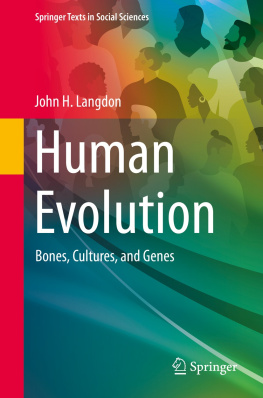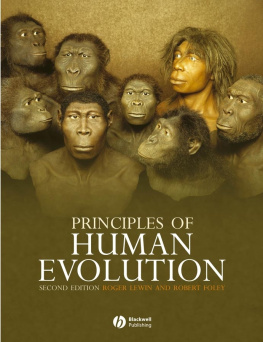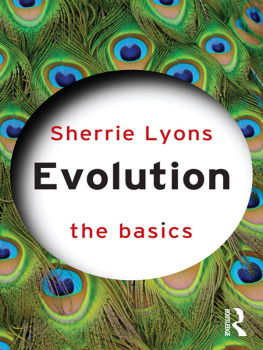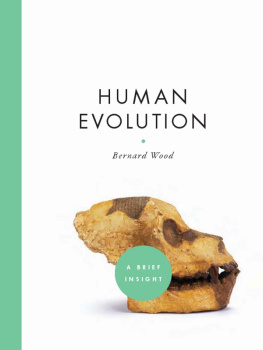Debating Humankinds
Place in Nature
18602000
The Nature of Paleoanthropology
Richard G. Delisle
ANTHROPOLOGY, MCGILL UNIVERSITY
PHILOSOPHY, UNIVERSIT DE MONTRAL
With introductory and concluding essays by
Milford H. Wolpoff and Bernard Wood
First published 2007 by Pearson Education, Inc.
Published 2016 by Routledge
2 Park Square, Milton Park, Abingdon, Oxon OX14 4RN
711 Third Avenue, New York, NY 10017, USA
Routledge is an imprint of the Taylor & Francis Group, an informa business
Copyright 2007 Taylor & Francis. All rights reserved.
All rights reserved. No part of this book may be reprinted or reproduced or utilised in any form or by any electronic, mechanical, or other means, now known or hereafter invented, including photocopying and recording, or in any information storage or retrieval system, without permission in writing from the publishers.
Notice:
Product or corporate names may be trademarks or registered trademarks, and are used only for identification and explanation without intent to infringe.
Credits and acknowledgments borrowed from other sources and reproduced, with permission, in this textbook appear on appropriate page within text.
ISBN: 9780131773905 (pbk)
Cover Design: Bruce Kenselaar
Library of Congress Cataloging-in-Publication Data
Delisle, Richard G.
Debating humankinds place in nature, 18602000 : the nature of paleoanthropology / by Richard G. Delisle; with introductory and concluding essays by Milford H. Wolpoff and Bernard Wood.
p. cm.(Advances in human evolution series)
Includes bibliographical references and index.
ISBN 0-13-177390-9
1. Fossil hominids. 2. Human evolution. 3. Paleoanthropology. I. Title. II. Series.
GN282. D43 2006
599.938dc22
2005054958
To the memory of my father Jacques Delisle
(19381992) who knew it all along
To Anik
for sharing her life with me
Contents
by Milford H. Wolpoff
Part I
A Synthesis of Approaches to Human Evolution, 18601890
Part II
Competing Approaches to Human Evolution, 18901935
Part III
Toward the Modern Research Structure in Paleoanthropology, 19352000
by Bernard Wood

This long project has its roots in a Ph.D. thesis entitled The Field of Human Evolution Within Evolutionary Biology and Anthropology: Historical and Epistemological Analyses since Inception (1999) prepared in the Palaeoanthropology Research Group, University of the Witwatersrand, Johannesburg. It has been conducted under the supervision of Phillip V. Tobias, to whom I wish to extend my deepest admiration and my warmest affection. This research was then continued in different institutional settings. In 2000, I joined the Department of Anthropology of McGill University, Montral, as a Lecturer. There, I received the unconditional support of Bruce G. Trigger and Michael Bisson. Thanks to the warm welcome of Henry de Lumley, I spent the academic year 20002001 at the Institut de Palontologie Humaine in Paris as a postdoctoral fellow. Another postdoctoral stay brought me to the Department of Anthropology at the Universit de Montral during the academic years of 20012003. It has been for me a great pleasure to work with Norman Clermont during those years. The book was completed in a different institutional context as I felt the need for new intellectual tools in my quest to understand scholars thinking about humankinds place in nature. This brought me to the preparation of another Ph.D. thesis, now in progress, in philosophy of biology at the Universit de Montral under the supervision of Franois Duchesneau. His credentials have been for me a genuine inspiration.
I am delighted that Milford H. Wolpoff and Bernard Wood so kindly accepted to write, respectively, an introductory essay and a concluding essay to this book. They were invited to do so in order to bring either complementary or contradictory viewpoints to the theses formulated here. Hopefully, this will contribute to stimulate further reflections on the much neglected history and philosophy of paleoanthropology. Bernard Wood was also very generous of his time in reading carefully the entire manuscript and suggesting numerous reccomendations to improve the quality of my writing. It is extremely difficult to fully master all the subtleties of a foreign language.
I am deeply indebted to the following institutions and the public agencies that kindly supported this research at one time or another: The University of the Witwatersrand (Burseries), the Foreign Affairs of the French Government (Bourses Chateaubriand), and the Government of Qubec (Fonds FCAR). As there were years of financial drought in the early moments of this project, private funding was generously provided by Monsieur Georges Forest. He always profoundly believed in the intellectual quest pursued here. I express my warmest gratitude to him.
This book is also about consulting many books and articles that are difficult to find. This task was made much easier by the remarkable patience of the staff of the Interloan Service of the McLennan Library, McGill University. The assistance of Patrick Pollet at the Institut de Palontologie Humaine was also invaluable. Many thanks for their much appreciated efforts. As this book is also about different languages, I received considerable help from Louis Bouchard of the Das Buch bookstore in Montral for German translations.
My warmest gratitude must also be extended to numerous people who contributed innumerable services. Their generosity made all the difference in the preparation of this project: Christine Delisle, Stphane Delisle, Claude Grondine, Robert Guay, David L. Hull, Anik Lebeau, Camille Limoges, Micheline Mayer, Paul Provost, the late Frank Spencer, and Ian Tattersall.
Lastly, I must express the joy I had working with Nancy Roberts at Prentice Hall and Russell L. Ciochon, the series editor. I would do it all over again if I could.
Richard G. Delisle
by Milford H. Wolpoff
I have the honor to introduce an exceptional history of paleoanthropology. Richard Delisle wrote his history as a paleoanthropologist with interests in history and the philosophy of science. His work raises many issuessome of these have been of deep concern to me through the years, and I appreciate the opportunity to discuss them.
It would be fair to expect that a history of paleoanthropology, especially a recent history, might look differently to different observers, and I write this as a practicing paleoanthropologist of almost forty years. Although my University of Illinois degree was in 1969, I wrote my first professional paper, on skeletal nasal aperture variation, in 1966. At sixty-two, thinking about my years in this profession sometimes makes me feel very old. But then I remind myself that sixty-two was the age at which Franz Weidenreich, my idol, left his recent appointment at the University of Chicago for Beijing, to replace Davidson Black who had just died unexpectedly. It was only then that he began the paleoanthropological work that resulted in numerous papers (including his polycentric theory) and the five major monographs on the Zhoukoudian remains that still stand as the finest exemplar for description and analysis of human fossils.












